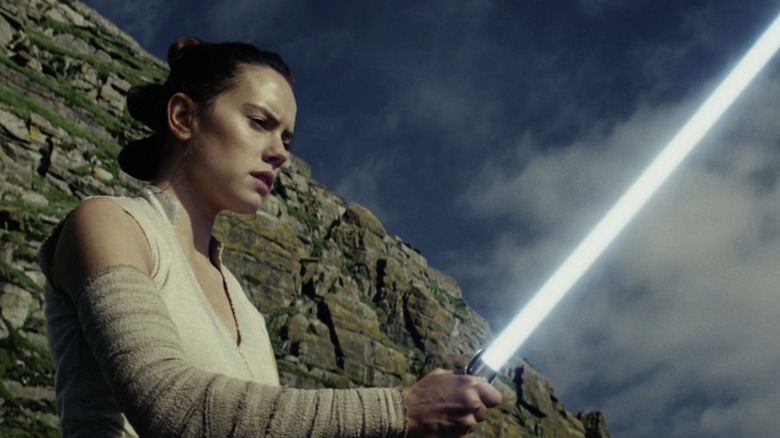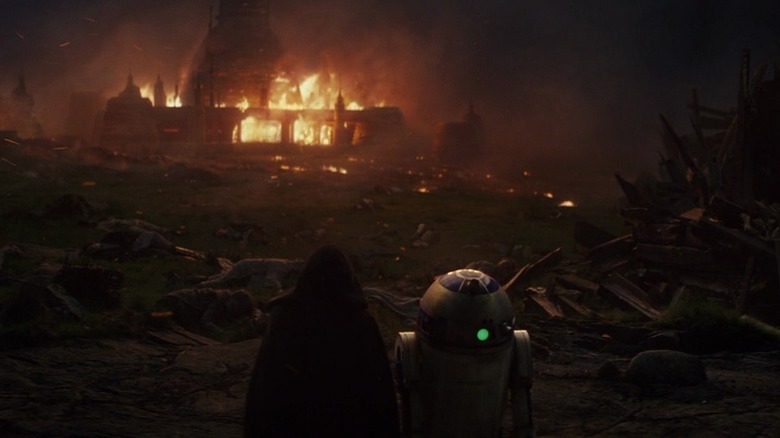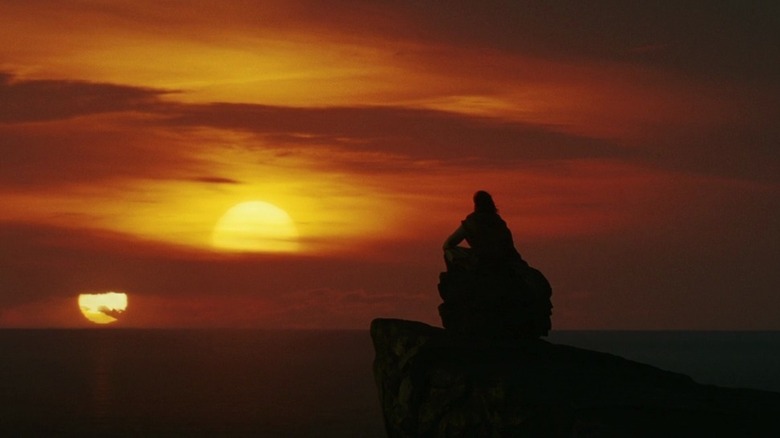The Aspect Of Rian Johnson's Star Wars: The Last Jedi That Surprised J.J. Abrams The Most
In a world post-"The Rise of Skywalker," it would be easy to assign the blame for everything that doesn't work in the "Star Wars" sequel trilogy to J.J. Abrams. To his credit, as familiar as "The Force Awakens" certainly was, it was effective at getting the general audience to adore and get invested in a brand new cast of characters. But, in a franchise that is forever haunted by the regurgitation of images from the past, Rian Johnson's sequel, "The Last Jedi" remains an astonishing achievement that forces its audience to consider the darker themes of a franchise that usually only confronts morality in terms of the dark side versus the light. It sparked a toxic, fandom hatred like no other, but it also is the film of the "Star Wars" sequel trilogy that continues to age with grace and sophistication in retrospect.
Without relitigating years upon years worth of debate and discourse, it's safe to say that for as great as Johnson's vision of "The Last Jedi" is, it is fundamentally at odds with everything Abrams set out to achieve when he directed "The Force Awakens." It makes the sequel trilogy a unique, contradictory experience. There's lots of wasted potential that is disheartening to hardcore fans, but from a filmmaking perspective, it's fascinating to see two distinct creative forces butting heads on such a massive budget and scale.
Abrams, who took on a producer role on "The Last Jedi," was just as surprised about Johnson's direction for the "Star Wars" sequel trilogy as we were watching it. In 2019, leading up to the release of "The Rise of Skywalker," Abrams spoke to Rolling Stone about ending the Skywalker Saga, and he vocalized what surprised him about Johnson's screenplay the most.
'Oh, that was unexpected.'
During the interview with Rolling Stone, J.J. Abrams opened up about reading Johnson's screenplay for the first time:
"When I read his first draft, it made me laugh because I saw that was his take and his voice. I got to watch cuts of the movie as he was working on it, as an audience member. And I appreciated the choices he made as a filmmaker that would probably be very different from the choices that I would have made. Just as he would have made different choices if he had made 'Episode VII.'"
"The Force Awakens" ended with Rey (Daisy Ridley) embarking on a journey to find the whereabouts of Luke Skywalker (Mark Hamill), who isolated himself from the rest of the galaxy not long after Ben Solo (Adam Driver) became Kylo Ren. It was unanimously expected that Rey would train with Luke, and a follow-up to Abrams' film would be a perfect parallel to "The Empire Strikes Back." However, instead of the boyish and optimistic Luke fans know and love, Johnson gave us a Luke that was colder and cynical — one that was ashamed of his past and embittered by the endless struggle against the dark side.
Abrams described how he felt about reading Luke's characterization for the first time:
"I felt the biggest surprise was how dark Luke was. That was the thing that I thought: 'Oh, that was unexpected.' And that's the thing 'The Last Jedi' undeniably succeeds at, which is constant subversion of expectation. The number of things that happened in that movie that aren't the thing you think is going to happen is pretty fun."
'The Last Jedi' is not as bleak as Abrams thinks
It's interesting to see J.J. Abrams vocally appreciate Rian Johnson's bold artistic choices and direction for the franchise, especially considering the "Rise of Skywalker" story we got. Whether it was pressure from higher-ups to respond to the massive vitriol lodged at "The Last Jedi," or a decision on his own accord, Abrams ultimately did a lot to undo Johnson's work when he stepped behind the camera again. In an effort to win back the fans that were alienated by "The Last Jedi," the result was a film that pleased no one in the process. As a film, it feels nasty and vindictive to the film that came before it.
Abrams is right that Johnson opted for a much darker take on Luke Skywalker than most would dare to attempt, but while Johnson's version of Luke is definitely jaded, I feel that many who mourn the idealistic hero they had in their heads don't often pay attention to how he grows throughout "The Last Jedi." Luke starts out a grumpy curmudgeon, but his perspective is actively challenged by our new gang of heroes. When lives are on the line, Luke puts his faith back towards Rey and the Resistance, the representation of future generations.
While he's not the Luke many of us imagined we'd be reunited with, Abrams' write-off of Johnson's portrayal of Luke as singularly dark and bleak shows is emblematic of how different Abrams and Johnson are as storytellers at their core. One filmmaker grounded his science-fiction world in emotional honesty and reality, and the other indulged in fantasy.


